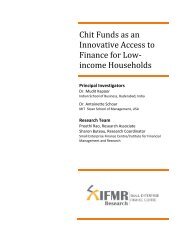Government of India Volume I: Analysis and Recommendations
Government of India Volume I: Analysis and Recommendations
Government of India Volume I: Analysis and Recommendations
Create successful ePaper yourself
Turn your PDF publications into a flip-book with our unique Google optimized e-Paper software.
FOUNDATIONS OF CONTRACTS AND PROPERTY<br />
Table <strong>of</strong> <strong>Recommendations</strong> 13.7 Issuance <strong>of</strong> securities<br />
With respect to issuance <strong>of</strong> securities the Commission recommends:<br />
1. M<strong>and</strong>ating the <strong>Government</strong> to publish a list <strong>of</strong> financial instruments which will be governed under securities<br />
law;<br />
2. That once an instrument is included in the list <strong>of</strong> securities, the trading <strong>of</strong> such instruments should be carried<br />
out under general principles <strong>of</strong> organised financial trading;<br />
3. Stipulating registration <strong>of</strong> the securities irrespective <strong>of</strong> the nature <strong>of</strong> the entity issuing them with specific<br />
requirements;<br />
4. Creating statutory basis for disclosure obligations on the issuer (which must be done through regulations),<br />
instead <strong>of</strong> being completely reliant on the listing agreement;<br />
5. Giving the regulator jurisdiction over issuers <strong>of</strong> securities when they approach a certain size or number <strong>of</strong><br />
purchasers;<br />
6. Creating exemptions from registration requirement <strong>of</strong> issues which are below a certain size;<br />
7. Empowering the regulator to regulate minimum corporate governance st<strong>and</strong>ards for issuers irrespective <strong>of</strong><br />
their legal structure; <strong>and</strong><br />
8. Empowering the regulator to frame regulations requiring disclosure <strong>of</strong> any change in ownership <strong>of</strong> the issuer<br />
entity (take over) <strong>and</strong> give investors a reasonable exit option is such event.<br />
ment, which is in turn reliant on the disclosures made by the entity as well as the transparency<br />
<strong>of</strong> its governance processes.<br />
The law must ensure that whenever any entity is raising capital from a fairly large pool<br />
<strong>of</strong> investors, it is properly managed <strong>and</strong> monitored. If such an entity is not managed <strong>and</strong><br />
monitored, unscrupulous persons may use such entities to commit fraud. This, in turn,<br />
may detrimentally affect investor confidence <strong>and</strong> the smooth functioning <strong>of</strong> markets.<br />
Accordingly, the Commission recommends that issuance <strong>of</strong> ‘security’ by any person<br />
must comply with certain registration requirements unless exempted by law. However,<br />
the Commission underst<strong>and</strong>s that such a broad definition may impose a prohibitive<br />
compliance cost on issuers. High compliance costs may limit the growth <strong>of</strong> small entrepreneurs.<br />
As such, broad exemptions need to be granted from the registration requirement<br />
for a limited number <strong>of</strong> issues to a limited number <strong>of</strong> people.<br />
Presently, various continuous obligations <strong>and</strong> corporate governance norms are embedded<br />
in the Companies Act, 1956. These naturally apply only to companies issuing ‘securities’.<br />
Various obligations applicable to issuers, such as corporate governance norms,<br />
arise from the listing agreement. The Commission is <strong>of</strong> the view that since ‘securities’<br />
may be issued by entities other than companies, the disclosure <strong>and</strong> governance norms<br />
<strong>of</strong> the issuer should be independent <strong>of</strong> the legal structure <strong>of</strong> the issuer. The Commission<br />
believes that obligations imposed on issuers <strong>of</strong> securities must be codified in statute <strong>and</strong><br />
elaborated by subordinate legislation or regulations.<br />
13.6.2. Trading <strong>of</strong> securities<br />
The Commission noted that while each type <strong>of</strong> securities may have specific legal issues<br />
related to creation, the organised trading <strong>of</strong> securities faces similar concerns about integrity.<br />
The Commission recommends that the law takes a unified approach to regulate<br />
the trading <strong>of</strong> securities. This would include exchanges, brokers, clearing houses <strong>and</strong><br />
payment systems. This would require a generalised definition <strong>of</strong> securities. The Commission<br />
found that there is no fixed definition <strong>of</strong> securities. Therefore it recommends that<br />
the Central <strong>Government</strong> should create a list <strong>of</strong> securities based on the underst<strong>and</strong>ing <strong>of</strong><br />
the financial sector.<br />
Table 13.7 gives a detailed summary <strong>of</strong> the specific recommendations <strong>of</strong> the Commission<br />
pertaining to disclosure <strong>and</strong> governance obligations to be applied to issuers <strong>of</strong><br />
securities.<br />
FINANCIAL SECTOR LEGISLATIVE REFORMS COMMISSION 127



